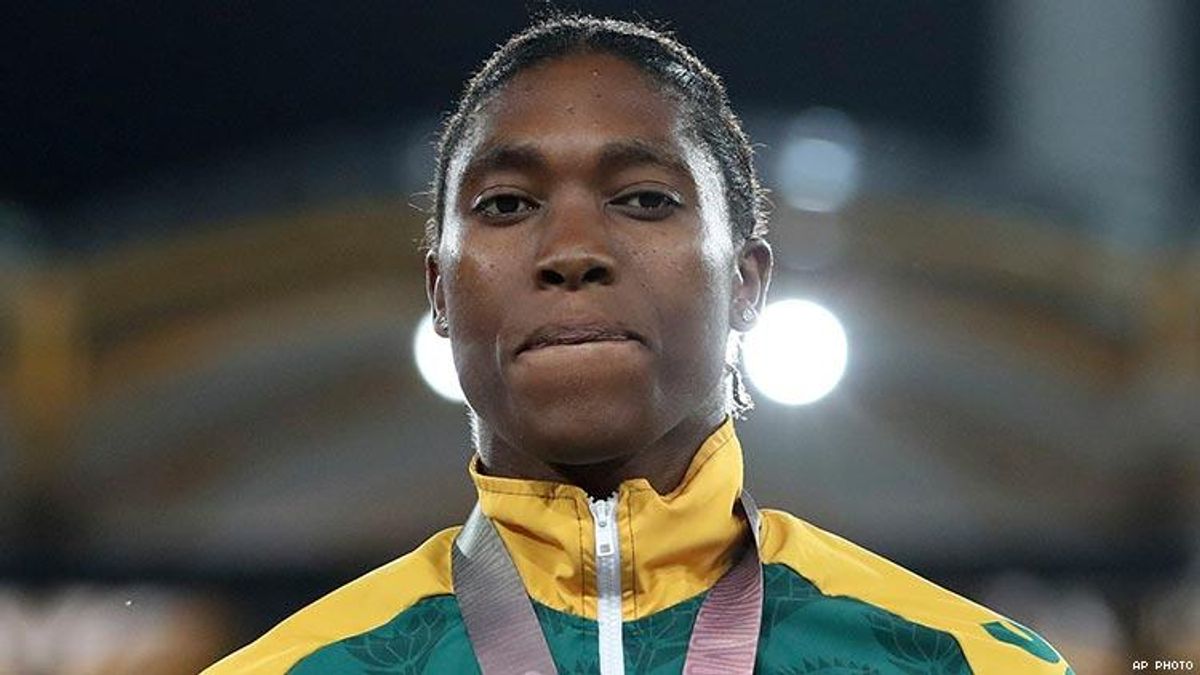Voices
Female Athletes Must Endure Invasive 'Sex Tests.' Men Don't

A deeply misogynistic practice by the governing body of sports must end, writes Athlete Ally's Anne Lieberman.
July 11 2018 12:31 AM EST
October 31 2024 6:16 AM EST
By continuing to use our site, you agree to our Private Policy and Terms of Use.

A deeply misogynistic practice by the governing body of sports must end, writes Athlete Ally's Anne Lieberman.
As sports fans, we celebrate people whose unique physical attributes -- coupled with hard work and grit -- make them exceptional athletes. We love Michael Phelps, whose shoulders and elbows are double-jointed, his arm span four inches greater than his height. We are wowed by Usain Bolt, whose 6-foot-5 frame allows for an 8-foot-long stride, making him the fastest sprinter in the world. We are amazed by Olympic archer Brady Ellison, whose 20/10 vision allows him to see insanely farther than any average human.
We celebrate those athletes -- unless, of course, they're women.
Far too often, when women are dominant in their sport, they are subject to deeply ingrained sexist ideas that female athletes are always inferior to men. And if they are women of color, they're subject to thinly veiled racism as well. Serena Williams is a perfect example of this intersection. Serena's talent and body have been a site of racist ridicule; she has faced comments steeped in colonial-era myths of black athletic prowess and endless commentary on her "masculine" body.
When women became too dominant, sport governing bodies, fans, and even other athletes competing alongside them begin to question whether they even belong in the female category. It's as if women who are incredible athletes can actually perform so well that they perform themselves right out of the female category.
But unlike media and fans, sport governing bodies go beyond "questioning" gender -- they test it. Female athletes (but never their male counterparts) have been subjected to humiliating sex testing practices since the late 1960s, all in the name of ensuring "fairness" in athletic competition.
We have seen this paternalistic hysteria around "protecting" women's sport most recently with a revised version of a suspended regulation by the International Association of Athletics Federations targeting women with naturally occurring testosterone. The IAAF believes that natural testosterone produces such an advantage in women athletes that women, among them Caster Semenya (pictured), should be forced to undergo medically unnecessary intervention to change their bodies in order to continue to compete in women's sport. Semenya filed a legal challenge to this discriminatory regulation last month in the Court of Arbitration for Sport.
The ideology is there, but the science is not. An almost identical regulation was suspended in 2015 by CAS after another woman of color from the global south -- Dutee Chand -- challenged it. Chand argued that the policy discriminated against athletes with atypical sex development. CAS carefully weighed an extensive body of scientific evidence and was unable to conclude that the impact of naturally elevated testosterone on women's performance was so much more substantial than the benefits caused by other factors, such as nutrition, access to specialist training facilities and coaching, and other genetic and biological variations.
The IAAF wrote in response to the criticism surrounding its minimally revamped 2018 regulation that it has "separate male and female categories [because] if it didn't females would never win any medals," further reiterating that the single biggest source of competitive advantage is testosterone. This is incredibly insulting and, again, based in science that is fundamentally flawed and steeped in ideology.
There are so many levels of complexity that go into the question of competitive advantage. Think about all of the other ways athletes have competitive advantage -- access to better coaches and facilities; money to pay for nutritionists, recovery services, etc. At the highest levels of sport, physical characterics can only get you so far -- you also need serious technical skill to be able to beat top competitors from around the world.
Women's sport remains incredibly powerful and important to me as a female athlete -- and especially as a queer athlete. This is issue is complex, and we need to be willing to examine what we think we know and understand about biological sex, testosterone, and competitive advantage. We need to examine the structures of power -- mostly run by white, wealthy men -- that are putting these regulations in place and pitting women against one another when we really should be examining why our bodily autonomy and our privacy are constantly being violated as athletes.
The stated aim of the regulation is "to ensure a level playing field for athletes." But instead, it polices women's bodies and puts a ceiling on women's athleticism that only serves to diminish women's sport -- not to protect it. Moreover, some have argued that the regulation should stay because it targets "very few women." Since when in the history of the struggle for human rights -- locally or globally -- have we thrown out the rights of the minority for the rights of the majority? Are we suggesting that some people's rights are more important, more salient than others?
As members of a global athletic community, we can and should do better. That's why Athlete Ally, together with the Women's Sports Foundation, organized over 60 athletes to sign an open letter calling on the IAAF to rescind this discriminatory policy. Sign this petition and stand in solidarity with us.
ANNE LIEBERMAN is the director of policy and programs at Athlete Ally.